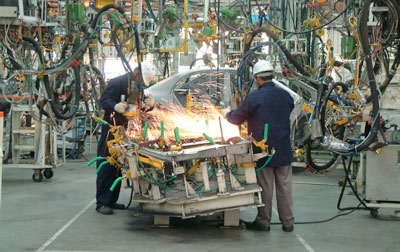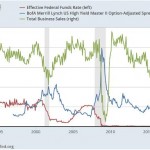Industrial Production Drops in Eurozone

Industrial production in the eurozone slipped in May, according to data published on Monday, reinforcing concern that a tentative economic recovery is already stalling.
Factory output fell 1.1 percent in the 18 countries of the currency bloc compared with April, said Eurostat, the European Union’s statistics agency. The decline in manufacturing was broad-based, including not only economically troubled countries like Portugal, but also Germany, the Continent’s economic engine.
While the eurozone has been growing since last year, unemployment remains almost 12 percent and some economists argue that the region is still effectively in recession. The industrial production figures on Monday add to recent evidence from surveys of business sentiment that the mild recovery is already losing steam.
“May’s sharp drop in industrial production highlights the lackluster and bumpy nature of the eurozone recovery,” Martin van Vliet, an economist at ING Bank, said in a note to investors. He noted that industrial production remains 12 percent below the peak achieved in 2008.
He said that some of the drop could be because of the timing of public holidays in May, and that output in June may have rebounded. The May 1 holiday in Europe fell on a Thursday, encouraging many to take Friday off as well, and may have suppressed economic activity.
Industrial production in all 28 countries of the European Union also fell 1.1 percent in May, Eurostat reported. The declines in May came after increases of 0.7 percent in April for both the eurozone and the European Union.
The biggest drop was in Portugal, where production fell 3.6 percent, according to the figures. The continuing problems in the country, one of the hardest hit by the eurozone crisis, sent shock waves through global financial markets last week after the parent of one of its banks, Banco Espírito Santo, missed payments on short-term debt.
Production during May declined in all of the eurozone’s largest economies, the data showed. It fell 1.4 percent in Germany, a center of automobile and machinery manufacturing that has largely escaped the worst of the economic crisis, while output dropped by 1.3 percent in France, by 1.2 percent in Italy, and by 0.9 percent in Spain, Eurostat said.
“One could make the case that the tentative recovery in the euro area has come to an abrupt halt,” analysts at Credit Suisse said in a note on Monday. “If true, the implications — for asset markets, the global economy, monetary policy, and social and economic stability in Europe — would be considerable.”
The Credit Suisse analysts said that they still expected the eurozone recovery to continue as demand from elsewhere in the world increases, and because of increases in consumer demand within Europe.
“There’s no evidence that the fundamentals of recovery have changed,” they said.
Source: NYT





























